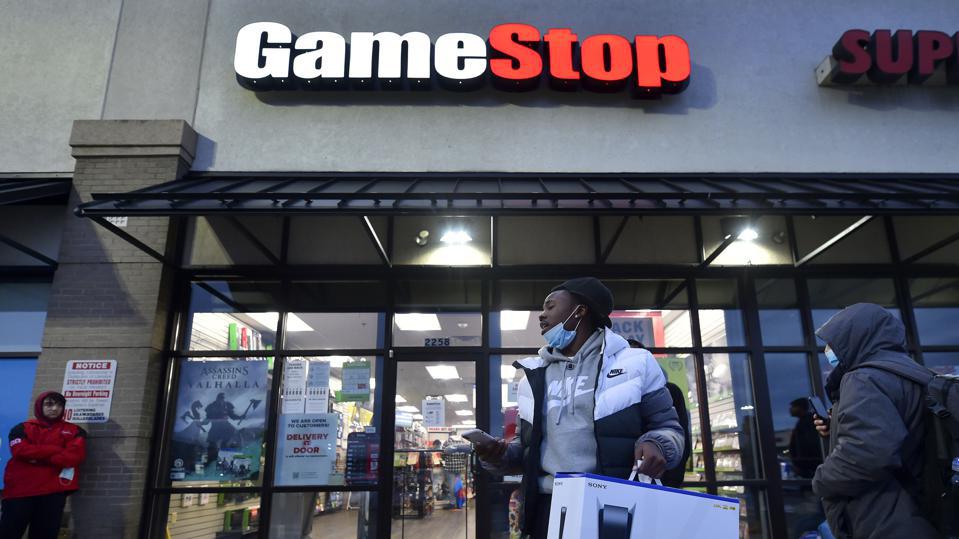Menu
Finance & Economics 101, Or: How Not to Buy $GME
- Negosyante News
- February 1, 2021
- 4:55 am

I am going to explain, as I have several times over the past few days, what the hell is happening with GME. Everyone should know at this point that most of the descriptions of what is happening are transparently wrong.
Let us start with an overview of how shorts work. You own a security. You loan that security to your broker. Your broker loans that security to a short seller. The short seller sells the loaned security at the current market price to a short buyer and plans to buy it back at a later date at the market price then. Their profit is (sale price – buy price) – interest.
GME’s short interest – the proportion of shares sold short relative to outstanding shares on the market – is (or, as of the latest info, was) above 1. That means that more shares were shorted than exist. This is not a naked short. A naked short is when, instead of borrowing a security, the short seller just… says they have the security and sells something they don’t have. This is very illegal unless you’re a market maker. This is also very detectable, as the buyer does not receive any shares.
Now, you may ask, “how can more shares be shorted than exist?” The answer is simple. The short buyer now has a long position on the equity. The short buyer’s broker can then borrow those stocks and loan them to a new short seller – or, maybe, the same short seller. An unlimited number of short sales can be performed on a single stock, and none of these shorts will be naked.
Furthermore, you may ask, “why does a short squeeze happen?” A short squeeze happens because the short seller is required by the broker to keep a certain amount of money in their margin account so that the broker can be reasonably sure they won’t get screwed if the share price goes to the moon and the short seller can’t afford to buy back the stock. If the price goes up and margin requirements increase, the short sellers will be forced to either dump more money in or to close their short positions by buying back the stock.
Because the price has gone up, the second alternative means the short sellers will lose money. When the short interest is above 1, this means that if the price goes up at all, there’s a decent chance it will trigger a buying frenzy, since the amount of stock all the short sellers have to buy to cover their position is greater than the number of stocks that are out there.
To be very clear: the inflated share price of $GME is a bubble. Everyone involved should be very aware that it is a bubble. The price is going up because, right now, everyone would like to buy GME. That means that eventually, the price will explosively deflate when the short interest drops enough and there isn’t so much pressure to buy.
I should note here that margin calls – when the broker asks someone to pony up, or they’ll seize their margin account and close out their positions – are very, very bad for the person getting margin called. The broker can do this when the short seller’s maintenance margin falls below a threshold without their input or consent. They want the stock that the short seller promised to give back to them so that they can give it to you, the person who loaned it to them. This means that if any of the institutional investors can’t meet a margin call, the price is going to explode because the broker will sell as much of the fund’s assets as it needs to in order to buy the stock back.
Now that we understand what a short squeeze actually is, we can talk about who’s losing here.
To start with, retail longs are not losing. They loaned their stocks to the broker, and brokers have more than enough money to deal with even some very large short accounts failing to be able to give them back the stock they borrowed.
The brokers are losing a little. They do, however, charge interest on the stock loans, which means that some amount of defaulting is priced in, and this is not where most of their money comes from. It could be painful but not terrible.
The short sellers, in this case, hedge funds, are losing significantly. Every dollar the stock climbs is 50 cents per share they need to scrounge up for the margin account, or else the brokers set off the bomb. They can try to raise this cash by diluting shares or borrowing money, but they’re carrying boatloads of toxic assets and they’ll get terms that reflect that.
The retail investors who bought recently and don’t have an exit strategy aren’t losing as much, since all they can lose is what they originally put in, but unless they’re smart about their exit strategy, they’ll get at least a little fucked. Stocks go down after the bubble pops, and this is a bubble. When enough shorts unwind (see above), the demand will go down and so will the price.
Now, what are the distributional impacts here?
If institutions – not the funds losing out, but other institutions – are front-running retail, they’ll make out like bandits. If the bomb does go off, exiting before GME crashes will be like catching a falling knife while wearing a fursuit.
Any retail investors who develop an exit strategy and execute before the price starts to fall will make even more money than the HFT guys front-running the detonation.
Any retail investors who got in at $400 and get out at $60 will… lose exactly that much money.
The hedge funds will go insolvent if the bomb goes off. This is likely to make the people that run them unemployed, but is unlikely to make them, personally, poor. Their clients, though, could lose everything.
So, the mega-rich will get richer, a few WSB experts will get filthy stinking rich, and most of the people bandwagoning over the last day will lose, but only out of what they put in. The Gamestop investors who have been holding since last year and haven’t taken any profits will have come out fine on the other side of the ride of their lives. The global financial system won’t collapse.
Now, is this market manipulation? Almost certainly not. The dynamics of the short squeeze don’t depend on privileged information and fraudulent claims are not being made.
And I think that covers most of what I’ve seen that’s just completely wrong.
Taken from HoopyFreud, edited for clarity and vulgarity.
#Top Tags COVID Covid-19 Technology Finance Investing Sustainability Economy

Subscribe to Our Newsletter and get a free pdf:



















Comments are closed for this article!